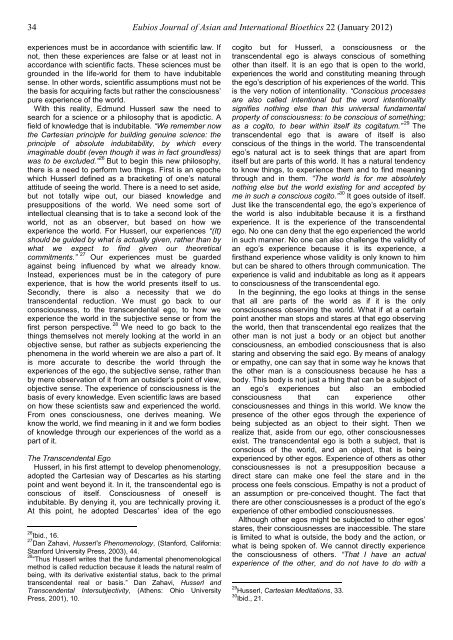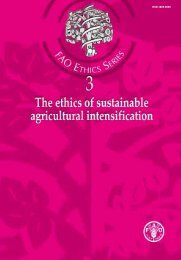Eubios Journal of Asian and International Bioethics - Eubios Ethics ...
Eubios Journal of Asian and International Bioethics - Eubios Ethics ...
Eubios Journal of Asian and International Bioethics - Eubios Ethics ...
Create successful ePaper yourself
Turn your PDF publications into a flip-book with our unique Google optimized e-Paper software.
34 <strong>Eubios</strong> <strong>Journal</strong> <strong>of</strong> <strong>Asian</strong> <strong>and</strong> <strong>International</strong> <strong>Bioethics</strong> 22 (January 2012)<br />
experiences must be in accordance with scientific law. If<br />
not, then these experiences are false or at least not in<br />
accordance with scientific facts. These sciences must be<br />
grounded in the life-world for them to have indubitable<br />
sense. In other words, scientific assumptions must not be<br />
the basis for acquiring facts but rather the consciousness’<br />
pure experience <strong>of</strong> the world.<br />
With this reality, Edmund Husserl saw the need to<br />
search for a science or a philosophy that is apodictic. A<br />
field <strong>of</strong> knowledge that is indubitable. “We remember now<br />
the Cartesian principle for building genuine science: the<br />
principle <strong>of</strong> absolute indubitability, by which every<br />
imaginable doubt (even though it was in fact groundless)<br />
was to be excluded.” 26 But to begin this new philosophy,<br />
there is a need to perform two things. First is an epoche<br />
which Husserl defined as a bracketing <strong>of</strong> one’s natural<br />
attitude <strong>of</strong> seeing the world. There is a need to set aside,<br />
but not totally wipe out, our biased knowledge <strong>and</strong><br />
presuppositions <strong>of</strong> the world. We need some sort <strong>of</strong><br />
intellectual cleansing that is to take a second look <strong>of</strong> the<br />
world, not as an observer, but based on how we<br />
experience the world. For Husserl, our experiences “(It)<br />
should be guided by what is actually given, rather than by<br />
what we expect to find given our theoretical<br />
commitments.” 27 Our experiences must be guarded<br />
against being influenced by what we already know.<br />
Instead, experiences must be in the category <strong>of</strong> pure<br />
experience, that is how the world presents itself to us.<br />
Secondly, there is also a necessity that we do<br />
transcendental reduction. We must go back to our<br />
consciousness, to the transcendental ego, to how we<br />
experience the world in the subjective sense or from the<br />
first person perspective. 28 We need to go back to the<br />
things themselves not merely looking at the world in an<br />
objective sense, but rather as subjects experiencing the<br />
phenomena in the world wherein we are also a part <strong>of</strong>. It<br />
is more accurate to describe the world through the<br />
experiences <strong>of</strong> the ego, the subjective sense, rather than<br />
by mere observation <strong>of</strong> it from an outsider’s point <strong>of</strong> view,<br />
objective sense. The experience <strong>of</strong> consciousness is the<br />
basis <strong>of</strong> every knowledge. Even scientific laws are based<br />
on how these scientists saw <strong>and</strong> experienced the world.<br />
From ones consciousness, one derives meaning. We<br />
know the world, we find meaning in it <strong>and</strong> we form bodies<br />
<strong>of</strong> knowledge through our experiences <strong>of</strong> the world as a<br />
part <strong>of</strong> it.<br />
The Transcendental Ego<br />
Husserl, in his first attempt to develop phenomenology,<br />
adopted the Cartesian way <strong>of</strong> Descartes as his starting<br />
point <strong>and</strong> went beyond it. In it, the transcendental ego is<br />
conscious <strong>of</strong> itself. Consciousness <strong>of</strong> oneself is<br />
indubitable. By denying it, you are technically proving it.<br />
At this point, he adopted Descartes’ idea <strong>of</strong> the ego<br />
26 Ibid., 16.<br />
27 Dan Zahavi, Husserl’s Phenomenology, (Stanford, California:<br />
Stanford University Press, 2003), 44.<br />
28 “Thus Husserl writes that the fundamental phenomenological<br />
method is called reduction because it leads the natural realm <strong>of</strong><br />
being, with its derivative existential status, back to the primal<br />
transcendental real or basis.” Dan Zahavi, Husserl <strong>and</strong><br />
Transcendental Intersubjectivity, (Athens: Ohio University<br />
Press, 2001), 10.<br />
cogito but for Husserl, a consciousness or the<br />
transcendental ego is always conscious <strong>of</strong> something<br />
other than itself. It is an ego that is open to the world,<br />
experiences the world <strong>and</strong> constituting meaning through<br />
the ego’s description <strong>of</strong> his experiences <strong>of</strong> the world. This<br />
is the very notion <strong>of</strong> intentionality. “Conscious processes<br />
are also called intentional but the word intentionality<br />
signifies nothing else than this universal fundamental<br />
property <strong>of</strong> consciousness: to be conscious <strong>of</strong> something;<br />
as a cogito, to bear within itself its cogitatum.” 29 The<br />
transcendental ego that is aware <strong>of</strong> itself is also<br />
conscious <strong>of</strong> the things in the world. The transcendental<br />
ego’s natural act is to seek things that are apart from<br />
itself but are parts <strong>of</strong> this world. It has a natural tendency<br />
to know things, to experience them <strong>and</strong> to find meaning<br />
through <strong>and</strong> in them. “The world is for me absolutely<br />
nothing else but the world existing for <strong>and</strong> accepted by<br />
me in such a conscious cogito.” 30 It goes outside <strong>of</strong> itself.<br />
Just like the transcendental ego, the ego’s experience <strong>of</strong><br />
the world is also indubitable because it is a firsth<strong>and</strong><br />
experience. It is the experience <strong>of</strong> the transcendental<br />
ego. No one can deny that the ego experienced the world<br />
in such manner. No one can also challenge the validity <strong>of</strong><br />
an ego’s experience because it is its experience, a<br />
firsth<strong>and</strong> experience whose validity is only known to him<br />
but can be shared to others through communication. The<br />
experience is valid <strong>and</strong> indubitable as long as it appears<br />
to consciousness <strong>of</strong> the transcendental ego.<br />
In the beginning, the ego looks at things in the sense<br />
that all are parts <strong>of</strong> the world as if it is the only<br />
consciousness observing the world. What if at a certain<br />
point another man stops <strong>and</strong> stares at that ego observing<br />
the world, then that transcendental ego realizes that the<br />
other man is not just a body or an object but another<br />
consciousness, an embodied consciousness that is also<br />
staring <strong>and</strong> observing the said ego. By means <strong>of</strong> analogy<br />
or empathy, one can say that in some way he knows that<br />
the other man is a consciousness because he has a<br />
body. This body is not just a thing that can be a subject <strong>of</strong><br />
an ego’s experiences but also an embodied<br />
consciousness that can experience other<br />
consciousnesses <strong>and</strong> things in this world. We know the<br />
presence <strong>of</strong> the other egos through the experience <strong>of</strong><br />
being subjected as an object to their sight. Then we<br />
realize that, aside from our ego, other consciousnesses<br />
exist. The transcendental ego is both a subject, that is<br />
conscious <strong>of</strong> the world, <strong>and</strong> an object, that is being<br />
experienced by other egos. Experience <strong>of</strong> others as other<br />
consciousnesses is not a presupposition because a<br />
direct stare can make one feel the stare <strong>and</strong> in the<br />
process one feels conscious. Empathy is not a product <strong>of</strong><br />
an assumption or pre-conceived thought. The fact that<br />
there are other consciousnesses is a product <strong>of</strong> the ego’s<br />
experience <strong>of</strong> other embodied consciousnesses.<br />
Although other egos might be subjected to other egos’<br />
stares, their consciousnesses are inaccessible. The stare<br />
is limited to what is outside, the body <strong>and</strong> the action, or<br />
what is being spoken <strong>of</strong>. We cannot directly experience<br />
the consciousness <strong>of</strong> others. “That I have an actual<br />
experience <strong>of</strong> the other, <strong>and</strong> do not have to do with a<br />
29 Husserl, Cartesian Meditations, 33.<br />
30 Ibid., 21.

















